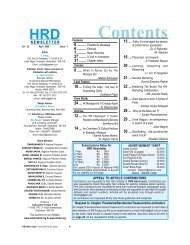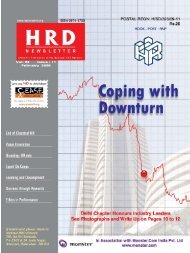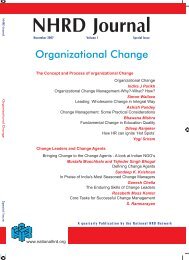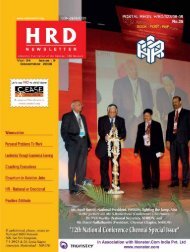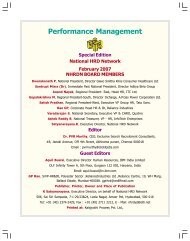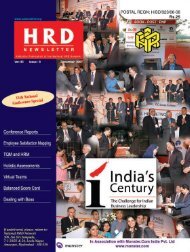New Year Resolutions of a Manager - National HRD Network
New Year Resolutions of a Manager - National HRD Network
New Year Resolutions of a Manager - National HRD Network
You also want an ePaper? Increase the reach of your titles
YUMPU automatically turns print PDFs into web optimized ePapers that Google loves.
From<br />
<strong>National</strong> President’s Desk<br />
Non-monetary rewards<br />
Bob Nelson a famous motivational speaker<br />
and author, once said "You get what you<br />
reward."<br />
I couldn't agree more with him. There is<br />
nothing more satisfying than a simple word<br />
<strong>of</strong> praise from your manager. While many<br />
types <strong>of</strong> rewards and recognition have direct<br />
costs associated with them, there are others<br />
which may be less tangible, but still very<br />
effective. These "non-monetary" rewards<br />
include formal and informal<br />
acknowledgement, assignment <strong>of</strong> more<br />
enjoyable job duties, opportunities for<br />
training, and an increased role in decisionmaking.<br />
This article focuses on non-<br />
Editorial<br />
What do we deal with day in and day out, in<br />
our organisations and in our communities,<br />
by and large? With notably exceptional<br />
situations, the list includes: problems,<br />
tiredness, burn-out, anger, depression,<br />
frustration, emotional and physical violence,<br />
competition, adversity, greed…How about<br />
the new year beginning on a positive note?<br />
Behavioral sciences have dealt extensively<br />
with matters as above; maybe rightly so. But,<br />
there is the other side to human life, as in<br />
the list <strong>of</strong> six core virtues stated in the<br />
Character Strengths and Virtues handbook:<br />
1. Wisdom and Knowledge: creativity,<br />
curiosity, open-mindedness, love <strong>of</strong><br />
learning, perspective<br />
2. Courage: bravery, persistence, integrity,<br />
vitality<br />
3. Humanity: love, kindness, social<br />
intelligence<br />
4. Justice: citizenship, fairness, leadership<br />
5. Temperance: forgiveness and mercy,<br />
humility and modesty, prudence, selfregulation<br />
6. Transcendence: appreciation <strong>of</strong> beauty<br />
and excellence, gratitude, hope, humor,<br />
spirituality<br />
(at http://en.wikipedia.org/wiki/<br />
Positive_Psychology. On December 23,<br />
2006)<br />
monetary rewards, and as we will see, these<br />
types <strong>of</strong> rewards can be very meaningful to<br />
employees and so, very motivating for<br />
performance improvement.<br />
To achieve desired goals, reward systems<br />
should be closely aligned to organizational<br />
strategies.<br />
Non-monetary recognition can be very<br />
motivating, helping to build feelings <strong>of</strong><br />
confidence and satisfaction. It can also lead<br />
to increased employee retention<br />
To be really effective, the managers should<br />
get to know different employees' likes and<br />
dislikes. Research indicates that the type<br />
<strong>of</strong> recognition employees appreciate most<br />
is to be recognized by people they work<br />
directly for. The number one choice for<br />
recognition is sincere praise given in a timely<br />
manner with specific examples.<br />
A branch <strong>of</strong> psychology called Positive<br />
Psychology has been making rapid strides<br />
and inroads into studying the conditions and<br />
processes that contribute to the flourishing<br />
or optimal functioning <strong>of</strong> people, groups and<br />
institutions (Gable and Haidt, 2005; abstract;<br />
p.103). A growing number <strong>of</strong> psychologists<br />
are continuously developing theories and<br />
practices that involved human happiness<br />
positivity to the predominantly negativity<br />
engaging the attention <strong>of</strong> scholars and<br />
practitioners.<br />
In their seminal paper that introduced the<br />
special issue <strong>of</strong> American Psychologist<br />
devoted to Positive Psychology, Selgman<br />
and Csikszentmihalyi (2000; p. 10) wrote: If<br />
psychologists wish to improve the human<br />
condition, it is not enough to help those who<br />
suffer. The majority <strong>of</strong> "normal" people also<br />
need examples and advice to reach a richer<br />
and more fulfilling existence. This is why<br />
early investigators…were interested in<br />
exploring spiritual ecstasy, play, creativity,<br />
and peak experiences.<br />
Scolars like William James, Carl Jung, Carl<br />
Rogers, Abraham Maslow, Martin Seligman,<br />
Albert Bandura, Mihali Csikszentmihalyi,<br />
Shelly Gable, Jonathan Haidt, and so on<br />
have been at Positive Psychology for several<br />
years. Gable and Haidt (2005) called for a<br />
movement on Positive Psychology to<br />
develop because the advances in<br />
psychology have come "at the cost <strong>of</strong><br />
understanding what is right with people." (p.<br />
105). They note that "…despite the<br />
Being chosen to work on a task team to<br />
accomplish a company initiative is<br />
motivating because it helps employees gain<br />
new skills and experiences, demonstrates<br />
trust in their abilities, and adds variety to an<br />
individual's work. Individual Development<br />
Plans help identify strong candidates for<br />
developmental opportunities.<br />
Hence, I would advise all to make creative<br />
use <strong>of</strong> personalized non-monetary rewards<br />
reinforces positive behaviors and improves<br />
employee retention and performance. These<br />
types <strong>of</strong> recognition can be inexpensive to<br />
give, but priceless to receive<br />
I wish all the readers and Fellow<br />
pr<strong>of</strong>essionals a Happy and Prosperous<br />
2007.<br />
P. Dwarakanath<br />
philosophical,<br />
historical, and<br />
theoretical<br />
underpinnings<br />
that led to the<br />
c u r r e n t<br />
imbalance in<br />
psychology<br />
[ t o w a r d<br />
negativity], we<br />
believe that there<br />
is little empirical<br />
justification for our predominantly negative<br />
view <strong>of</strong> human nature and the human<br />
condition. (p. 107).<br />
Developments such as appreciative inquiry,<br />
whole system involvement, holism etc. are<br />
directly or indirectly related to what Positive<br />
Psychology has been calling for.<br />
Through this editorial, I strongly urge<br />
students, researchers, teachers, scholars,<br />
practitioners and my fellow HR pr<strong>of</strong>essionals<br />
to join this movement! Being positive does<br />
no harm; in fact it empowers, it elevates, it<br />
engulfs.<br />
References:<br />
Gable, S.L. & Haidt, J. (2005). What (and<br />
Why) Is Positive Psychology? Review <strong>of</strong><br />
General Psychology, 9(2), 103-110.<br />
Seligman, M.E.P & Csikszentmihalyi, M.<br />
(2000). Positive Psychology: An Introduction,<br />
American Psychologist, 55(1), 5-14.<br />
C. Balaji<br />
| <strong>HRD</strong> <strong>New</strong>s Letter | January 2007, Vol.22, Issue:10 5|




